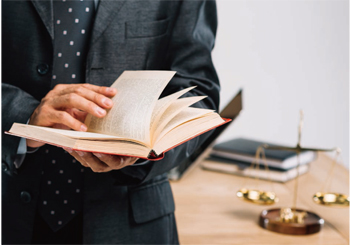04.2019 Life Guide
A Brief Talk on the Breakthrough of the Third Trial of Appeal in Specific Criminal Cases
Far Eastern New Century Corporation / Tang Junjie


With regard to the principle of appeal in criminal cases, I believe that many people do not understand it very well. Can all cases be appealed? Can the same case be appealed all the time? What are the principles of appeal? This issue of Legal Column aims at the analysis of reorganize's latest third instance appeal in criminal cases to help everyone safeguard their rights and interests.
Case description
Xiao Ming, a new recruit in the society, provided the withdrawal card and account password to the company at the request of the interview company, but was used by the company as the head account of telephone fraud. Xiao Ming was prosecuted by the prosecutor as a helper of fraud. The court of first instance ruled Xiao Ming innocent, the prosecutor appealed to the court of second instance, but the court of second instance changed Xiao Ming's conviction. Can Xiaoming, who is deeply conscious of innocence, appeal to the Supreme Court?
Legal Analysis
1. Current criminal proceedings in Taiwan adopt the system of "three-tier and three-tier trial"
At present, the trial-level system of criminal cases in Taiwan adopts "three-tier and three-tier trial" in principle, which refers to the trial-level of the courts, i.e. the local court, the high court and the Supreme Court; the so-called "three-tier trial" refers to the procedure of case trial, and if the parties refuse to accept the judgment of the local court (the first instance), they can appeal to the high court; for example, the high court. If the judgment of (second instance) is not satisfied, in principle, it may be appealed to the Supreme Court (third instance). The court of first and second instance hears the facts of the case, while the court of third instance only hears the judgments made by the court of first and second instance, whether there is any violation of the applicable law, and does not recognize the facts of the case.
2. Before amending the law, all criminal cases belonging to seven specific types shall not be appealed to the court of third instance.
In principle, although criminal cases can be appealed to the Supreme Court, it consumes judicial resources in order to avoid indiscriminate appeals by the parties, but also to ease the burden of the Supreme Court cases and allow judges to concentrate on dealing with more important and complex cases. Therefore, the Criminal Procedure Law sets the following two restrictions on appealing to the Court of Third Instance:
(1) The reason for appeal must be that the judgment of the court of second instance is contrary to the statute (Note 1)
(2) The following seven types of criminal cases belonging to minor offences or specific types of crimes shall not be appealed to the court of third instance (Note 2) after the judgment of the second trial: (1) the most serious punishment is the crime of fixed-term imprisonment, criminal detention or special fine of less than three years; (2) the crime of theft of articles 320 and 321 of the Criminal Law; (3) the crime of embezzlement of articles 335 and 336 of the Criminal Law; (4) the crime of embezzlement of articles 339 and 344 of the Criminal Law. The crime of fraud in Article 1, the crime of breach of faith in Article 342 of the Criminal Law, the crime of intimidation in Article 346 of the Criminal Law and the crime of stolen goods in Article 349 of the Criminal Law.
3. After amending the law, seven criminal cases may be appealed to the court of third instance in exceptional circumstances.
Article 376 of the Criminal Procedure Law stipulates that no appeal shall be made to the Court of Third Instance in any of the seven cases of minor offences or minor offences due to the types, nature and effective use of judicial resources. Although it has legitimate legislative considerations, Xiao Ming, in the same case, has been acquitted in the first instance and entered the second instance on appeal by the prosecutor. If convicted by the court of second instance, according to Article 376 of the Criminal Procedure Law before the amendment, fraud cases can not be appealed to the court of third instance, Xiao Ming will no longer be able to appeal to the court of third instance in the usual procedure, which has deprived Xiao Ming of the opportunity to appeal against the first conviction.
In response to the above situation, the Justice Court's Justice Council issued Interpretation No. 752 on 28 July 2017, which concluded that Article 376 of the Criminal Procedure Law stipulates that seven types of cases shall not be appealed to the Court of Third Instance. If the Court of First Instance decides not to be guilty and the Court of Second Instance decides guilty, the defendant who has first convicted will therefore be unable to appeal to the Court of Third Instance. Failure to provide people with at least one opportunity to appeal relief is contrary to Article 16 of the Constitution, which guarantees the people's right to litigation. It shall be ineffective from the date of publication of Interpretation No. 752 of the Annotation of the Assembly of Chancellors (Note 3).
In other words, the meeting of justices of the Court of Justice held that, while legislators must stipulate which criminal cases may not be appealed to the Court of Third Instance, they should ensure that defendants who cannot appeal to the case of Third Instance should have at least one opportunity to appeal relief for conviction.
Based on the intention of Interpretation No. 752 of the Interpretation of the Judicial Court's Judges'Meeting, the Legislative Court also adopted the amendment of Article 376 of the Criminal Procedure Law on the third reading of November 16, 2017 (Note 4). For the seven cases which cannot be appealed to the Court of Third Instance, it added the provision that the Court of Third Instance may appeal to the Court of Third Instance exceptionally, that is, if seven cases are found innocent in the first instance and convicted in the second instance The defendant or the person appealing for the interests of the defendant may appeal to the court of third instance.
epilogue
In summary, although the crime committed by Xiao Ming is a crime of fraud, according to the provisions of Article 376 of the Criminal Procedure Law, in principle, no appeal can be filed with the court of third instance, but because Xiao Ming's case belongs to the situation of innocence in the first instance and guilt in the second instance, which conforms to the provisions of Article 376 of the Criminal Procedure Law, Xiao Ming can appeal to the Supreme Court on the conviction in the second instance.
Notes
1. Article 377 of the Code of Criminal Procedure: "Appeals to the court of third instance shall not be made on the grounds that the judgment violates the decree. "
2. Article 376 of the Criminal Procedure Law of the Republic of China before its amendment on November 16, 106: "Cases of the following crimes shall not be appealed to the Court of Third Instance if judged by the second instance. 1. The heaviest penalty shall be fixed-term imprisonment of not more than three years, criminal detention or special fine. 2. Theft in Articles 320 and 321 of the Criminal Law. 3. Crime of embezzlement under Article 335 and Item 2 of Article 336 of the Criminal Law. 4. Crimes of fraud under Articles 339 and 341 of the Criminal Law. 5. Crime of breach of faith in Article 342 of the Criminal Law. 6. The crime of intimidation under Article 346 of the Criminal Law. Seventh, the crime of stolen goods in Item 1 of Article 349 of the Criminal Law. "
3. Interpretation No. 572 by the Chancellor of Justice: "Article 376, paragraph 1 and paragraph 2, of the Criminal Procedure Law stipulates that a case of the following offences shall not be appealed to the Court of Third Instance if judged by the second instance: 1. The maximum capital punishment shall be a crime of fixed-term imprisonment of not more than three years, criminal detention or a special fine. 2. Theft in Articles 320 and 321 of the Criminal Law. If a person is convicted in the first instance and rejects an appeal or rescinds the original judgment in the second instance and considers himself guilty, it is stipulated that he shall not appeal to the court of the third instance. This is within the scope of legislation and is not contrary to the intention of Article 16 of the Constitution to guarantee the people's right of action. However, the defendant shall not appeal to the court of third instance if the original innocence judgment is revoked in the second instance and he is guilty of the judgment, failing to provide at least one opportunity for appeal relief, which is contrary to the intention of Article 16 of the Constitution to safeguard the people's right to litigation, and shall be ineffective from the date of promulgation of this interpretation. "
4. Article 376 of the Criminal Procedure Law: "A case of the following offences shall not be appealed to the court of third instance if it has been decided by the second instance. However, if the judgment of the court of first instance is innocent, exempted from prosecution, inadmissible or incorrect in jurisdiction, the court of second instance revokes the judgment and informs the convicted person, the defendant or the person who can appeal for the defendant's interests may appeal. First, the maximum capital punishment is the crime of fixed-term imprisonment of less than three years, criminal detention or special fine. 2. Theft in Articles 320 and 321 of the Criminal Law. 3. Crime of embezzlement under Article 335 and Item 2 of Article 336 of the Criminal Law. 4. Crimes of fraud under Articles 339 and 341 of the Criminal Law. 5. Crime of breach of faith in Article 342 of the Criminal Law. 6. The crime of intimidation under Article 346 of the Criminal Law. Seventh, the crime of stolen goods in Item 1 of Article 349 of the Criminal Law. If an appeal is cancelled by the court of third instance and returned to the court of first instance for judgment in accordance with the proviso of the preceding paragraph, it shall not be appealed to the court of third instance. "





















